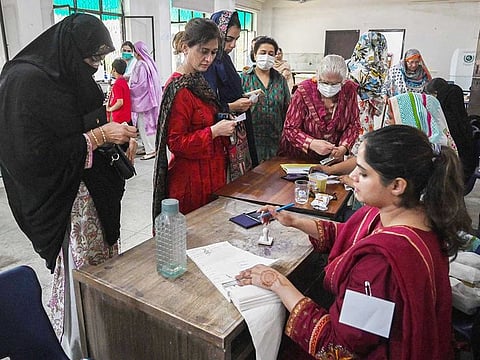Pakistan law minister rules out online voting for overseas residents in upcoming polls
Tarar’s comments come after meeting of parliamentary committee on electoral reforms

Islamabad: Law Minister Azam Nazeer Tarar has dismissed the possibility of online voting for overseas Pakistanis in the upcoming general elections, ruling out any amendments to the election laws to facilitate remote voting.
Tarar’s comments came after an in-camera meeting of the parliamentary committee on electoral reforms, where the issue of internet voting was discussed. Following the meeting, the law minister told reporters that overseas Pakistanis would not be able to vote through the Internet in the 2023 general elections.
Online voting demand
The demand for online voting has emerged as a central focus for more than 12 million overseas Pakistanis who seek the right to vote in the country’s elections. The locally-developed electronic voting machines (EVMs) were first introduced for pilot projects in late 2021 during Imran Khan’s tenure. The machines were launched to ensure electoral transparency in the country where allegations of rigging have been a persistent concern. Back in 2018, the Supreme Court directed the Election Commission of Pakistan (ECP) and the National Database and Registration Authority (NADRA) to develop a system that would ensure the right to vote for overseas Pakistanis, underlining that every citizen has the right to vote under the Constitution.
E-voting issue in Pakistan
The use of EVMs has been a subject of intense debate in Pakistani politics in recent years. In 2021, the previous administration of Imran Khan introduced amendments to the Elections Act 2017, which allowed the use of EVMs and granted overseas Pakistanis the right to vote electronically in general elections. However, the reforms were reversed when the Pakistan Democratic Movement-led government, under Prime Minister Shehbaz Sharif, passed the Elections (Amendment) Bill 2022, which revoked the use of EVMs and internet voting. President Arif Alvi also returned the unsigned bill seeking controversial changes in the election laws. The bill faced resistance and legal challenges but was eventually signed into law by then-acting President Sadiq Sanjrani in June this year.
The Shehbaz Sharif government has denied the impression that the amendments were aimed at depriving overseas Pakistanis of their right to vote. Law Minister Tarar clarified that the government was not against the use of technology but had concerns about its potential misuse and cited concerns raised by the election commission. He added that internet voting “pilot projects will not be allowed” in view of the reports of the parliamentary committee and the Supreme Court.
With the country’s current coalition administration concluding its tenure in mid-August 2023, a caretaker setup will take over in preparation for the scheduled general elections later this year.
Sign up for the Daily Briefing
Get the latest news and updates straight to your inbox



